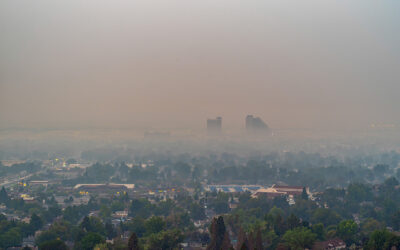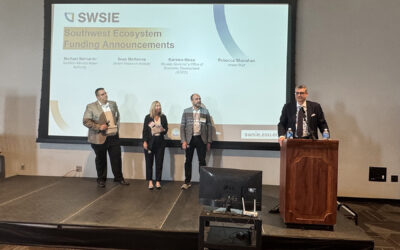DRI scientist Christine Albano, Ph.D., is the recipient of the 2023 Rising Researcher Award from the Nevada System of Higher Education (NSHE) Board of Regents
DRI scientist Christine Albano, Ph.D., is the recipient of the 2023 Rising Researcher Award from the Nevada System of Higher Education (NSHE) Board of Regents, in recognition of her outstanding early-career accomplishments and potential for advancing scientific knowledge in the field of earth and environmental sciences.
Dr. Albano is an Assistant Research Professor in DRI’s Division of Hydrologic Sciences, where her work focuses on understanding the impacts of atmospheric rivers and other extreme atmospheric events on the hydrology of landscapes over time.
“I’m incredibly grateful for this award,” Albano said. “I’ve so appreciated the mentorship and support I’ve received from DRI management and colleagues over the past several years. It’s a place where I’ve felt encouraged to do work that I think is interesting and important.”

DRI scientist Christine Albano, Ph.D
Dr. Albano began at DRI as a Ph.D. student and dedicated her dissertation work to improving our understanding of how atmospheric rivers impact water storage and flood risk in the Sierra Nevada and Great Basin regions. She has continued to expand her research interests, using her background in conservation biology and ecology to connect extreme hydrologic events to impacts on ecosystems in new and novel ways. In 2022, she published ground-breaking work quantifying changes in evaporative demand across the U.S. over the last 20 years, and the implications for irrigated agriculture.
Dr. Albano has published 28 peer-reviewed journal articles and reports, with two more in review. She has worked with countless research teams, partners, and stakeholders to complete projects funded by agencies such as the NSF, USDA, U.S. Army Corps of Engineers, and several federal land management agencies. She finds that working with state and federal agencies to develop research approaches that lead to improved conservation and sustainable use of natural resources is the most rewarding aspect of her work.
“Dr. Albano’s innovative research has already made her a leader in her field,” said DRI Vice President for Research Vic Etyemezian, Ph.D. “In addition to publishing her research in high-impact peer-review journals, she brings so much to both DRI and the broader community by communicating her research results with the media and the public.”
In addition to her impressive research portfolio, Albano utilizes her experience working with non-profit conservation organizations to include community stakeholders in the scientific process. She contributes to mentoring the next generation of scientists by serving on the Graduate Program in Hydrologic Sciences faculty and is mentoring her first Ph.D. student. She also teaches advanced climatology in the UNR graduate school and has led workshops teaching the R programming language to undergraduate students at UNR and Salish Kootenay College.
Dr. Albano holds a B.S. in biology with minors in chemistry and environmental studies from Westminster College, and a M.S. in ecology from Colorado State University. Her Ph.D. in hydrology was completed in 2019 under the mentorship of DRI and UNR’s Maureen McCarthy and Michael Dettinger. She continued in DRI’s ecohydrology lab working alongside Justin Huntington for her postdoctoral research and became an Assistant Research Professor in 2020.
###
About DRI
The Desert Research Institute (DRI) is a recognized world leader in basic and applied environmental research. Committed to scientific excellence and integrity, DRI faculty, students who work alongside them, and staff have developed scientific knowledge and innovative technologies in research projects around the globe. Since 1959, DRI’s research has advanced scientific knowledge on topics ranging from humans’ impact on the environment to the environment’s impact on humans. DRI’s impactful science and inspiring solutions support Nevada’s diverse economy, provide science-based educational opportunities, and inform policymakers, business leaders, and community members. With campuses in Las Vegas and Reno, DRI serves as the non-profit research arm of the Nevada System of Higher Education. For more information, please visit www.dri.edu.


